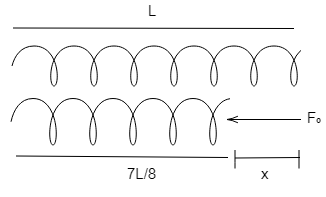Question
Question: A spring of natural length \(L\) is compressed to length \(\dfrac{{7L}}{8}\) exerts a force \({F_o}\...
A spring of natural length L is compressed to length 87L exerts a force Fo. The work done by the spring in restoring itself to natural length is:
(A)25FoL
(B)16FoL
(C)253FoL
(D)8FoL
Solution
In order to solve this question, we will firstly find the change in the length of the spring. Then with the help of it, we will find the spring constant. In the end, we will apply the concept that the work done by the spring is equal to the change in its potential energy.
Complete step by step solution:
According to the question given to us, the diagram will be as follows,

So, let the change in length of the spring caused by the compression be x
Now, this value of x is given by,
x=L−87L
x=88L−7L
x=8L
Now, we know that the force acting on the spring is given by the expression,
Fo=kx.....(1)
Where k is the spring constant.
On putting the value x=8L in equation (1), we get,
Fo=8kL
On taking k on one side and all other terms on the other side, we get,
k=L8Fo
Now, we know that the work done on a spring is equal to the change in its potential energy. So,
Work done = Change in the potential energy
W=21kx2
On putting the value of spring constant and the change in the length, we get,
W=21×L8Fo×(8L)2
W=21×L8Fo×64L2
On further solving, we get,
W=16FoL
The work done by the spring in restoring itself to natural length is W=16FoL.
So, the final answer is (B)16FoL.
Note:
The concept of spring constant, which has been used to solve this question, has come from Hooke's law. The main purpose of the spring constant is to find out how much force will be required in order to deform a particular spring.
